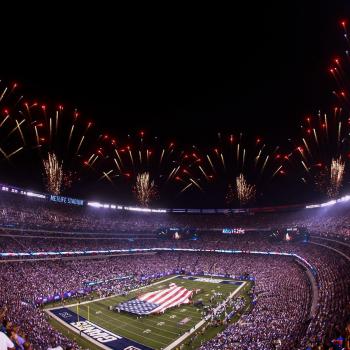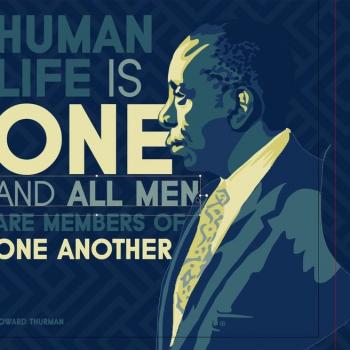The egoistic emotions can be very violent, agitating, destructive -- the result, to some extent, of what the Buddhists call attachment. There are other words for that: you might say one is "swallowed" by a personal reaction, an egoistic reaction, and it becomes someone's whole identity and there's a violence attached to it.
So one can believe in God in such a violent, attached way that it becomes its very opposite in terms of its quality, its action, its effect on human life, its effect on oneself. It can become as bad as murder. And one can be an atheist so passionately that one is willing to steamroll down and destroy anyone who disagrees. Most fundamentalists and atheists are not that extreme. But some are. And so we have to acknowledge, just because I say I love Man it doesn't mean I actually do.
When this gets into the political sphere it always becomes violent. It becomes destructive. Not necessarily physically, but legally, emotionally, socially. All kinds of ways. You must love your neighbor or I'll kill you! This is not an exaggeration. You see this kind of thing. That's one of the things that happens with religion. The statements, the expression can be very nice, but the forces through it are deadly. It can be atheism or Christianity or Judaism, or it can be a soccer game. That's the thing.
Now, an atheist can not believe in the conventional religious gods of the culture and still feel a great sense of the sacred, even if you don't call it sacred. And there are many people, great scientists, who feel this way.
When I was younger I was totally allergic to what I saw as religion: Judaism and even worse, Christianity -- it was my enemy. But I loved nature, and for me nature was sacred. I didn't use that word, but it made me quiet; it made me feel a sense of something greater than myself; it made me wish to serve something. So I was an atheist, but I recall it as spiritual -- a spiritual atheism.
How did your ideas about religion change?
Well, as I say, in my life it was more or less thrust upon me. I needed a job. It was 1962 -- ancient times -- I was hired at San Francisco State and I was obliged to teach a course called the History of Western Religious Thought. For me I had no desire to teach anything like that. I was totally allergic to religion. But I had training as a philosophy student, a grad student, a Ph.D. I did very well, was at the best colleges, best universities -- Harvard, Yale -- and I was willing to undertake preparing myself to teach such a course. Philosophers generally don't want to come anywhere near that kind of stuff -- nor did I. But I honorably tried to prepare myself.
It meant I had to read theologians, Christian writers like St. Augustine -- whom I had hated. You see in my book where I talk about burning the pages of the book, that's exactly what happened. I'm not exaggerating. I was so happy to see it go up in flames; I had suffered so much from that book. And later I read it and I loved it -- a great, great man.
So it forced me to read and prepare myself, and I couldn't believe how superficial my understanding of religion had been, even with a liberal education from the best universities. I discovered things about religion; I couldn't believe how good, how interesting, how profound -- and how distorted it had become, how shallow it had become. So more and more I got deeply interested in religion because I had to teach it. And then I got personally interested in my own personal, spiritual search, which I started to undertake.
Which came to you by happenstance, as you describe it.
Yes, by happenstance. There's a long story there too. I encountered the particular teaching of Gurdjieff when I was quite young, in college, and abandoned it. And by chance in San Francisco someone who was part of that was in my class and at first I thought, No, I've already tried that and I'm not interested. But he urged me to read a book. I read it. I realized there is something here after all.
So that was a parallel. My personal inner work was parallel with my academic work in a way. Although I never made the connection between God and what I had studied with the Gurdjieff teaching. It was not a religion, it was something else. It wasn't called a religion, wasn't meant to be equated with religion. And there were reasons for that. I think Gurdjieff felt that the language of religion had become too associated with things that were not really sacred. It's a complicated story.
In any case the personal search paralleled my study of religion, mystical traditions especially, and then Eastern traditions -- Hinduism, Buddhism -- that got deeper and deeper. And my inner life, personally. And there was a point when those two lines touched each other. And all the emotional force, the emotional power, of the word God that had come to me in my childhood, all that emotional power that had been suppressed and hidden in some dark place -- when those things came together it was like the sun rose. It was: Ah, that's what God is. I've already experienced it. Not at the deepest -- there are many levels -- but that was one level.




